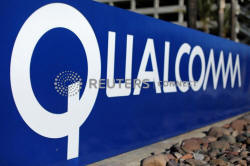|
"Qualcomm's licensing practices have strangled
competition in the CDMA and the premium LTE modem chip markets
for years, and harmed rivals, OEMs, and end consumers in the
process," U.S. District Judge Lucy Koh wrote in a ruling on
Tuesday.
Qualcomm's operating segment relating to its chip and software
business is called Qualcomm CDMA Technologies (QCT). Qualcomm's
operating segment relating to the licensing of its patents is
called Qualcomm Technology Licensing (QTL).
Koh sided with the U.S. Federal Trade Commission, which in 2017
filed a lawsuit against Qualcomm, accusing the company of using
"anticompetitive" tactics to maintain its monopoly on a key
semiconductor used in mobile phones.
In its complaint, the FTC said the patents that Qualcomm sought
to license are standard essential patents, which means that the
industry uses them widely and they are supposed to be licensed
on fair, reasonable and non-discriminatory terms.
The FTC complaint also accused Qualcomm of refusing to license
some standard essential patents to rival chipmakers, and of
entering into an exclusive deal with Apple Inc.
Qualcomm's licensing practices have been the subject of
government investigations in the U.S. since at least 2014 and in
Asia and Europe since at least 2009, according to the court
filing.
Qualcomm did not immediately respond to a Reuters request for
comment.
Shares of the company fell 13% to $67.50 in trading before the
bell on Wednesday.
(Reporting by Sayanti Chakraborty in Bengaluru; Editing by Arun
Koyyur, Bernard Orr)
[© 2019 Thomson Reuters. All rights
reserved.] Copyright 2019 Reuters. All rights reserved. This material may not be published,
broadcast, rewritten or redistributed.
Thompson Reuters is solely responsible for this content.

|
|




